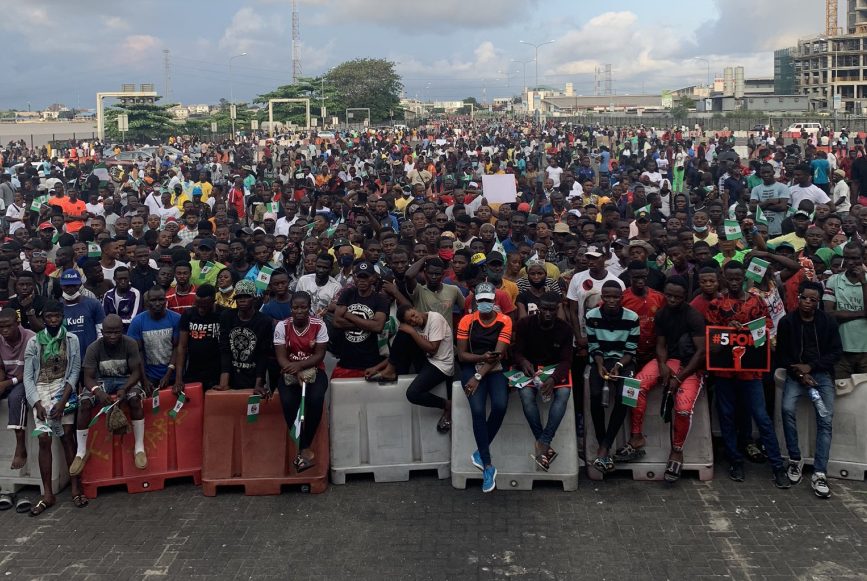#EndSARS: Five Years on and Nigeria’s Elusive Redemption

Nigerian youths at the lekki toll gate during the 2020 #EndSARS protest. Photo Credit- Nairametric
October 20, 2025, marks five years since the night that shattered Nigeria’s fragile faith in its institutions. Under the glare of floodlights at the Lekki Toll Gate in Lagos, unarmed young protesters, waving the green-white-green flag, singing the national anthem, were mowed down by soldiers who arrived not to protect, but to eradicate. What began as a clarion call against police brutality under the #EndSARS banner ended in a hail of live ammunition, leaving at least 12 dead, dozens injured, and a nation scarred by the deliberate erasure of its youth. This was no mere “incident,” as the government once sneered; it was a massacre, a calculated assault on dissent that exposed the rot at the heart of Nigeria’s power structure.
The fifth anniversary commemoration unfolded like a somber requiem across social media and scattered vigils, a far cry from the defiant energy of 2020. On social media, voices echoed the raw grief: one user shared a haunting video of soldiers firing into the crowd, captioning it with a plea for international eyes to witness the “injustice” that demands no silence. Another marked the day with a simple, searing truth: “5 years later and it still feels like yesterday. Many died, many lost body parts. Families lost their loved ones. Just because we said Our Lives Mattered!!” Non-governmental organizations have occasionally hosted virtual panels, dissecting the unfulfilled demands: the dissolution of SARS; achieved on paper but not in practice, justice for victims, independent probes, psychological support, and compensation. Yet, many like myself, only wonders and ask the rhetorical question “What changed since then? Nothing.”
The remembrances were poignant hashtags like #EndSarsRemembrance and #WhoOrderedTheKillings trended briefly, but they carried the weight of exhaustion, a collective sigh from a generation betrayed not once, but repeatedly. Critics might dismiss these anniversaries as performative nostalgia, a ritual for likes and retweets in a country where outrage cycles faster than fuel queues. And in some corners, denial persists: one post branded the event a “hoax” orchestrated by “insurrectionists” to torch Lagos, echoing the official gaslighting that called it a “phantom massacre.”
This revisionism isn’t accidental; it’s the state’s survival tactic, a refusal to confront the 2021 Judicial Panel of Inquiry’s damning verdict that equated the shootings to a “massacre” and indicted the military for unprovoked killings. No high-ranking officer has faced trial. Compensation trickles out like alms, meager, delayed, insulting. The toll gate itself reopened in 2021 amid fresh protests, a symbol of commerce triumphing over corpses. In a nation where Deborah Samuel’s 2022 lynching for blasphemy sparked more fury than this state-sanctioned slaughter, the critique sharpens: our moral compass is calibrated to convenience, not courage.
But here’s the deeper indictment: the massacre wasn’t an aberration; it was a blueprint. Five years on, police brutality festers under new acronyms like SWAT, while extrajudicial killings claim lives in Plateau’s villages and Kwara’s farmlands, often unreported because the victims aren’t camera-ready urban youth. The #EndSARS fire, meant to burn down systemic rot, was doused not by reform but by distraction, hijacked narratives of “hoodlums” looting, frozen bank accounts of activists, and a Twitter ban to muzzle the messengers.
Today, as economic despair under fuel subsidy removal and naira devaluation mirrors the 2020 despair that birthed the protests, the youth are splintered: some chase visas abroad, others scroll past the pain, and a defiant few, like those converging on October 20 despite overlapping calls for Nnamdi Kanu’s release, refuse to let the embers die. This overlap, Sowore’s dual protest banner, underscores a fractured front: noble causes colliding in a calendar squeezed by trauma.
The continued struggle for redemption? It’s an extremely effortfull toil, but not futile. The Lekki ghosts demand more than tears, they call for a reckoning. Nigeria’s leaders, from the villa in Abuja to the marbled halls of Alausa, must face the inquiry’s ghost: who gave the order? Prosecute the perpetrators, not the panelists. Fund the therapy for survivors haunted by that night’s echoes. And dismantle the godfatherism that treats citizens as collateral in elite power plays. Redemption isn’t in plaques or payouts; it’s in prevention, in a police force rebuilt for service, not subjugation.
As the sun sets on this fifth year, let us honor Kolade Johnson, Eyitayo Oluwole, and the unnamed who fell not as statistics, but as sparks. Their blood watered a seed of awakening that no bullet can fully uproot. In remembering, we resist. In resisting, we redeem. Nigeria’s youth didn’t die for hashtags, they died for a tomorrow we must seize, before the next October claims more. The toll gate stands, but so do we. Unbroken. Unbowed. Unforgotten.

